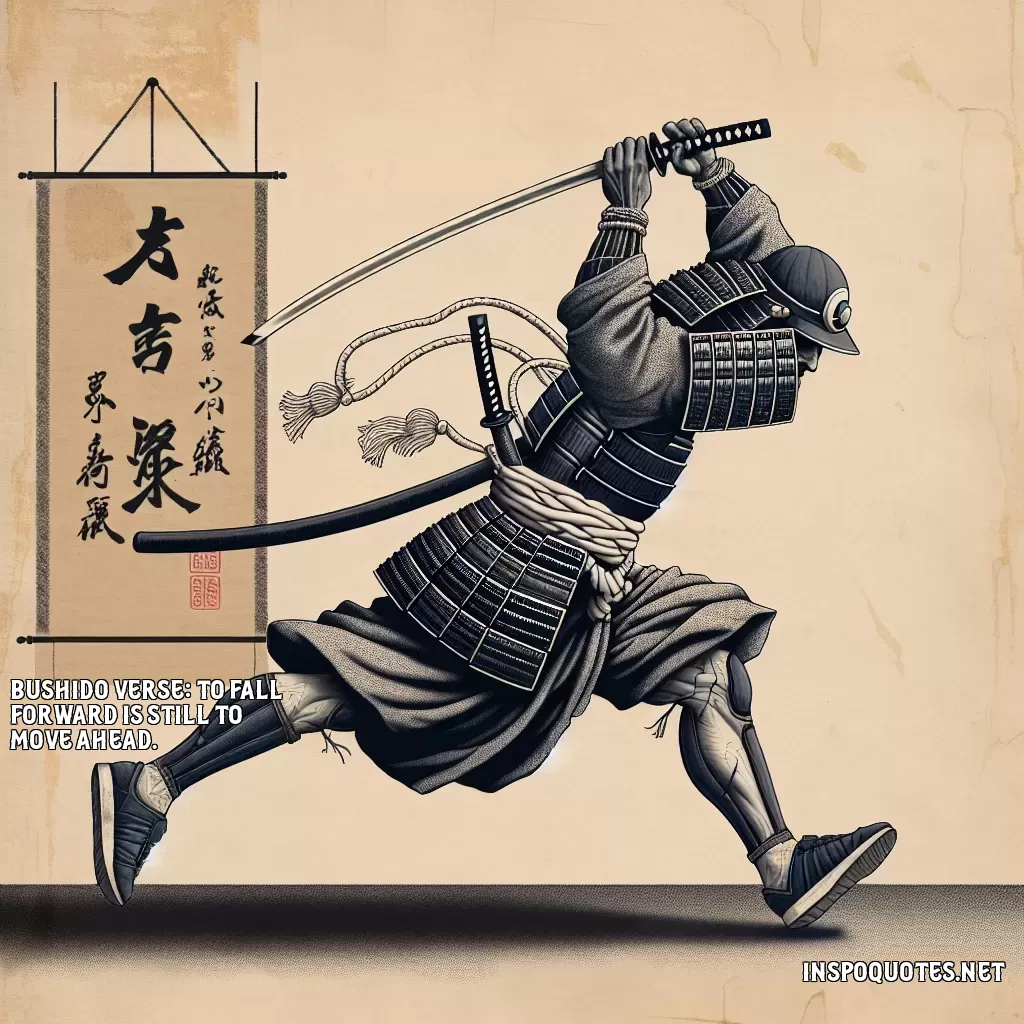
Bushido Verse: To fall forward is still to move ahead.
Author: Kakuzo Okakura
👁️ 3 views
The quote "To fall forward is still to move ahead" from the Bushido Verse encapsulates a profound understanding of resilience and perseverance. Bushido, the way of the samurai, emphasizes virtues such as courage, honor, and determination. This saying aligns with these principles by highlighting the importance of progress even in the face of setbacks. At its core, the quote suggests that failure or mistakes are not necessarily negative experiences. Instead, they can be steps toward growth and development. Falling forward implies that even when we stumble, if we maintain the right attitude and direction, we are still advancing towards our goals. This perspective encourages a mindset that does not fear failure but sees it as an essential part of any journey. When we "fall forward," we learn from our errors and use the experience to propel ourselves further along our path. It reinforces the idea that progress is not always linear and that success often requires overcoming obstacles and enduring struggles. By recognizing and accepting this truth, individuals can maintain their focus and momentum, undeterred by momentary defeats. Moreover, this concept fosters resilience. It teaches that each effort, even if flawed, contributes to our ultimate achievements. Psychologically, this promotes a growth mindset as it encourages viewing challenges as opportunities to learn rather than insurmountable barriers. Therefore, "To fall forward is still to move ahead" ultimately advocates for persistence, positivity, and the continuous pursuit of self-betterment.
Quote By: Kakuzo Okakura
Kakuzo Okakura, born on February 14, 1862, in Yokohama, Japan, was a prominent figure in the cultural exchange between Japan and the West during the late 19th and early 20th centuries. A scholar, art historian, and philosopher, Okakura is often celebrated for his deep understanding of Japanese aesthetics and his ability to articulate the significance of Asian art to a Western audience. He grew up during a time of rapid modernization in Japan, as the country opened its doors to Western influence and technology following the Meiji Restoration in 1868.
Okakura’s formal education began at the Tokyo Art School, where he nurtured his passion for traditional Japanese art forms. He later became an advocate for the preservation and appreciation of Japanese culture at a time when many felt the need to adopt Western ideals. Throughout his life, Okakura sought to promote the beauty of Japanese art and philosophy, emphasizing its unique qualities amid the global influence of Western thought.
One of Kakuzo Okakura's most significant contributions to art and culture is his influential book, "The Book of Tea," published in 1906. In this work, Okakura explores the aesthetics of the Japanese tea ceremony, linking it to broader themes of Zen Buddhism and Japanese culture. “The Book of Tea” not only became a classic text but also served as a bridge for Western audiences to understand the subtleties and depth of Japanese artistic practices. Okakura skillfully articulated the philosophical underpinnings of tea culture, emphasizing simplicity, harmony, and the beauty found in the mundane.
In addition to his authorship, Kakuzo Okakura played a pivotal role in establishing the Fine Arts School in Tokyo, where he helped shape the next generation of Japanese artists. His efforts were instrumental in promoting a renewed interest in traditional Japanese art forms. Ultimately, Okakura’s legacy lies in his dedication to preserving and celebrating Japanese culture while facilitating a dialogue with the West. He passed away on September 1, 1913, but his writings and ideas continue to influence the appreciation of Eastern aesthetics across the globe.